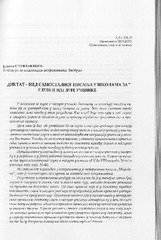Приказ основних података о документу
Dictation: A form of independent writing in schools for deaf and hard of hearing students
Diktat - vid samostalnog pisanja u školama za gluve i nagluve učenike
| dc.creator | Stevanović, Jelena | |
| dc.date.accessioned | 2021-03-17T13:30:12Z | |
| dc.date.available | 2021-03-17T13:30:12Z | |
| dc.date.issued | 2010 | |
| dc.identifier.issn | 0354-8759 | |
| dc.identifier.uri | http://ipir.ipisr.org.rs/handle/123456789/159 | |
| dc.description.abstract | Dictation receives special attention in schools for deaf and hard of hearing students since it is used with the aim of lip-reading. For that reason, dictation should be implemented as frequently as possible in all grades. As in hearing children, in both deaf and hard of hearing students dictation serves the purpose of testing the knowledge of certain grammar and orthography rules. Our goal was to determine whether deaf and hard of hearing students apply orthographic rules while transcribing a text according to dictation and what is the influence of age, degree of hearing impairment and gender on the achievement of this student population in transcribing a dictation. In addition to this, whether there are any differences in the degree of applying orthographic rules while transcribing a text according to dictation between deaf and hard of hearing students and the students who attend regular primary school. Research was conducted in schools for deaf and hard of hearing students in Belgrade and Jagodina and in one regular primary school in Belgrade. The sample consisted of two groups of respondents: deaf and hard of hearing students from 5th to 8th grade, N=67, and hearing students, N=60. The instrument used in the research is an informal text 'My Grandma', devised exclusively for the purposes of this research. Research results point out to the conclusion that a considerably smaller number of deaf and hard of hearing students, compared to the number of hearing children, transcribed the dictated sentences in an orthographically permissible way. Out of all rules that should be complied with in the dictation, deaf and hard of hearing students adhere only to the rules about using a full stop at the end of the sentence. The worst achievement in applying orthographic rules in dictation was accomplished by deaf and hard of hearing students with respect to transcribing the date of birth, that is, with respect to the rule about writing a full stop after numbers transcribed by digits. Students' age, degree of hearing impairment and gender did not exert a significant influence on application of orthographic rules in the dictation, except in the case of complying with the rule about using a full stop in transcribing dates, since girls accomplished a better achievement than boys. | en |
| dc.description.abstract | U školama za gluve i nagluve učenike diktatu se posvećuje posebna pažnja jer se upotrebljava u cilju čitanja sa usana. Zbog toga diktat treba izvoditi što češće u svim razredima. Kao i kod dece koja čuju i kod gluvih i nagluvih učenika diktat služi za proveru određenih gramatičkih i pravopisnih pravila. Cilj nam je bio da utvrdimo da li gluvi i nagluvi učenici primenjuju ortografska pravila dok po diktatu pišu tekst i kakav je uticaj uzrasta, stepena oštećenja sluha i pola na postignuće ove populacije učenika u pisanju diktata. Takođe, da li postoje razlike u stepenu primenjivanja pravopisnih pravila tokom pisanja teksta no diktatu između gluvih i nagluvih učenika i učenika koji pohađaju redovnu osnovnu školu. Istraživanje je sprovedeno u školama za gluve i nagluve učenike u Beogradu i u Jagodini i u jednoj redovnoj beogradskoj osnovnoj školi. Uzorak su činile dve grupe ispitanika: gluvi i nagluvi učenici od V do VIII razreda, N-67 i učenici koji čuju, N=60. Instrument korišćen u istraživanju je neformalni tekst 'Moja baka', koji je koncipiran isključivo za potrebe ovog istraživanja. Rezultati istraživanja upućuju na zaključak da je u značajno manji broj gluvih i nagluvih učenika, nego učenika koji čuju, napisao diktat rečenica na pravopisno dopustiv način. Od svih pravila koja je u diktatu trebalo poštovati, gluvi i nagluvi učenici se pridržavaju jedino pravila o upotrebi tačke na kraju rečenice. Najlošije postignuće u primenjivanju ortografskih pravila u diktatu gluvi i nagluvi učenici ostvarili su u vezi sa pisanjem datuma rođenja, odnosno o primeni pravila o pisanju tačke iza ciframa ispisanih brojeva. Uzrast učenika, stepen oštećenja sluha i pol nisu imali značajan uticaj na primenjivanje ortografskih pravila u diktatu, osim u slučaju poštovanja pravila o upotrebi tačke u pisanju datuma, s obzirom na to da su devojčice ostvarile bolje postignuće od dečaka. | sr |
| dc.publisher | Beograd : Fakultet za specijalnu edukaciju i rehabilitaciju | |
| dc.rights | openAccess | |
| dc.source | Beogradska defektološka škola | |
| dc.subject | dictation | en |
| dc.subject | orthography of Serbian language | en |
| dc.subject | orthographic rules | en |
| dc.subject | fields of orthography | en |
| dc.subject | deaf and hard of hearing students | en |
| dc.subject | hearing students | en |
| dc.subject | diktat | sr |
| dc.subject | pravopis srpskog jezika | sr |
| dc.subject | pravopisna pravila | sr |
| dc.subject | pravopisne oblasti | sr |
| dc.subject | gluvi i nagluvi učenici | sr |
| dc.subject | učenici koji čuju | sr |
| dc.title | Dictation: A form of independent writing in schools for deaf and hard of hearing students | en |
| dc.title | Diktat - vid samostalnog pisanja u školama za gluve i nagluve učenike | sr |
| dc.type | article | |
| dc.rights.license | ARR | |
| dc.citation.epage | 94 | |
| dc.citation.issue | 1 | |
| dc.citation.other | (1): 79-94 | |
| dc.citation.rank | M52 | |
| dc.citation.spage | 79 | |
| dc.identifier.fulltext | http://ipir.ipisr.org.rs/bitstream/id/1237/Diktat_2010.pdf | |
| dc.identifier.rcub | https://hdl.handle.net/21.15107/rcub_ipir_159 | |
| dc.type.version | publishedVersion |

